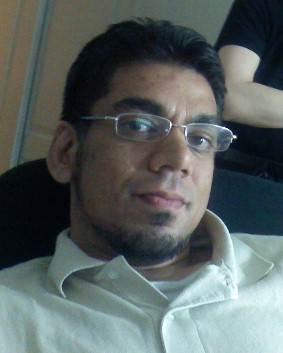
This interview is with Khalid Shaikh of FlyUpload. This guy founded YouSendIt, a file transfer service. Aside from a very good viral model, one reason why they became famous early on is because Iraqi militants used their service to send out videos of kidnapped contractors. The YouSendIt concept has spawned many new business models on the Internet, including YouTube. Some key points of the interview: Learn about a virtually unknown business model that has twice the traffic of Facebook (considered to be a $2 billion dollar company). Find out how these sites are achieving 30% monthly growth. Hear the inside story of the economics of this business model.
Full Interview Audio and Transcript
Fast Track Interview
Adrian Bye: Khalid, tell us a little bit about who you are and what you’ve been doing that’s interesting?
Khalid Shaikh: Well, I graduated in 2000 from McGill University in Canada with a degree in computer engineering. I’ve previously done engineering-level work at companies like Microsoft, HP and Nvida, but also I’ve been creating companies. There was a content business in 2000 called Glide Underground and a techno company called HP Tunnel somewhere in those years. The most interesting was in 2004 when I created a website called YouSendIt which ended up going pretty large. Over 44 terabytes of data sent a day with about 20 million dollars in funding. Most recently I’ve created this website called FlyUpload to capitalize on a very large market.
Adrian Bye: What kind of traffic do YouSendIt and FlyUpload have?
 Khalid Shaikh: YouSendIt at its peak it was doing 1.2 million downloads a day, with about 44 terabytes a day; now it does less than about 5 terabytes a day. And, FlyUpload is doing about 6 terabytes a day of data, with about a couple of 100,000 downloads a day.
Khalid Shaikh: YouSendIt at its peak it was doing 1.2 million downloads a day, with about 44 terabytes a day; now it does less than about 5 terabytes a day. And, FlyUpload is doing about 6 terabytes a day of data, with about a couple of 100,000 downloads a day.
Adrian Bye: YouSendIt and FlyUpload; are they similar business models?
Khalid Shaikh: I don’t think so. I would think that YouSendIt, actually created this space on the Internet. Wikipedia calls it ‘one-click hosting and references there are 130 websites in this space. The larger of these are Megaupload and RapidShare which are doing well above 10 million dollars a year in revenue and profitable with a team of less than ten employees. YouSendIt saw this space commoditizing and being run by small teams very efficiently and it moved up market to target small and medium business, so it’s focusing on creative professionals.
Adrian Bye: Explain how the model works for people who haven’t seen it.
Khalid Shaikh: YouSendIt and one-click’ hosters offer services that generally ask you to type in a recipient e-mail address, attach a file of any size up to two gigs and hit send. It’s about as simple as that. The file is uploaded to our servers and then we send out a link to the recipient.
Adrian Bye: And, so when you can’t e-mail a file of a certain size to someone and also have a permanent host for it, that’s the problem that you guys solve, is that correct?
Khalid Shaikh: Correct. Mainstream email services, like G-mail or Yahoo which offer infinite e-mail, actually have attachment limits of 10 to 30 megs.
Adrian Bye: RapidShare has an Alexa rank of 13. How do you come in and compete with that?
Khalid Shaikh: Well I’ll give it to you this way. As an entrepreneur, generally when you’re going at an investment they always take the biggest name and ask, "What are you going to do?" You end up building a fearless approach to attacking business. Yes, there are all these people in the market but you know their strengths and weaknesses. For example, RapidShare is not a very legitimate brand. It is hosted in Germany and Megaupload is not that clean a brand, their headquarters are hosted in Hong Kong. I’ve actually met the founders and team and they’re operating out of the Philippines. Both of their models are subscription only.
If you look at the big two out of the three .com IPO players, one’s Google, one’s Yahoo, one has 150 billion dollar market cap, the other a 30 billion dollar market cap. All of us here in the US know that advertising-based business models are disrupting non- advertising-based business models. If I invest heavily in very low-cost transit bandwidth stuff that I know is one-third cheaper than what YouTube is paying, because I was there when they were created, and invest in the advertising-based revenue model and build a platform on top of that, I confidently believe there’s a billion dollar market opportunity there. That’s where I’m aiming at. I’m really in it for the long term and we’ll see how it pans out.
Adrian Bye: So by subscription model what you mean is that RapidShare and Megaupload are, users can pay to become a member and get better service and downloads and stuff like that?
 Khalid Shaikh: That is correct. This new this generation of web technologies is all about giving services away and monetizing off ads. The friction between the billion dollars in advertising space and relatively small amount of dollars being spent online created that. Over the next five years more of that money is going to come online. It’s going to bring life to new business online and I aim to own something that has to do with media hosting online. And primarily, in all of these websites, the number one transferred file is video, number two is audio and the number three is photo, so really these are all media hosting companies.
Khalid Shaikh: That is correct. This new this generation of web technologies is all about giving services away and monetizing off ads. The friction between the billion dollars in advertising space and relatively small amount of dollars being spent online created that. Over the next five years more of that money is going to come online. It’s going to bring life to new business online and I aim to own something that has to do with media hosting online. And primarily, in all of these websites, the number one transferred file is video, number two is audio and the number three is photo, so really these are all media hosting companies.
Adrian Bye: Google is so incredibly profitable is because it shows very targeted ads. The user types in a key word, to pull up ads that are relevant to what they’re looking for at that moment. Display advertising can do some behavioral targeting but even still that’s not that accurate. At the end of the day what you’re showing is display advertising on a general interest download page. How are you going to get the level of profitability that some of these other companies can?
Khalid Shaikh: Right now, all I’m doing is display or basic banner ads, but we believe as the advertising market evolves new methods will come out. For example, the industry, even Google I’ve heard is slightly moving toward CPA verses CPC, Yahoo is doing the same thing. I believe new opportunities will present themselves and also that we have access to the user’s content. It’s not that hard to be able to target advertising. But obviously today is not the day where we have that kind of technologies available, so you kind of have to plant yourself in here, sit and wait and just grow a page for views while the advertising market develops itself.
Adrian Bye: And so looking then at your site, you launched FlyUpload what, about seven or eight months ago, is that right?
Khalid Shaikh: Yeah.
Adrian Bye: It’s an interesting model and you don’t do any kind of media buying whatsoever do you, it’s all just driven through viral?
Khalid Shaikh: Correct. Everything is driven viral traffic, no buying. There are a lot of competitors in the space that are operating very profitably but are also just aiming at the cash flow and not after capital markets.
Adrian Bye: Okay, so traffic comes virally, I mean I upload a file that I need to send and then I send an e-mail to you or does the service send an e-mail to you or do I just send an e-mail to you?
Khalid Shaikh: The service sends the e-mail to you.
Adrian Bye: So I put in your e-mail address, the service e-mails you and says, "Hey, there’s a file here from Adrian, you can go and download it now."
Khalid Shaikh: Correct, that’s it.
Adrian Bye: So the better monetization you can do on the download page, then the larger files you can offer more?
Khalid Shaikh: That’s exactly the idea. If you’re focused on making money today, what you’re going to do is maximize your revenue. If you’re focused on making money tomorrow, you’ll invest all of that money into upping that limit so that the users have a better service which will differentiate you from the competitors.
Adrian Bye: Are you guys self-funded or do you have investors?
Khalid Shaikh: I liquidated money I got from parting with YouSendIt and used that to purchase the IP and assets and then invest in the operations. We are meeting with investors but I’ve learned that just partnering with an investor and getting 20 million dollars doesn’t necessarily make you succeed. Partnering with the right investor that believes in the vision and the long-term opportunity and lets the executive team operate, that’s really the investor you want to work with. So I’d rather decline millions of dollars than to work with an investor that may not agree with the vision.
Adrian Bye: How many page views are you getting per day on your download page?
Khalid Shaikh: Right now it’s about one million visits a month and about 200,000 download page views a day.
Adrian Bye: You mentioned you’re interested in working with people that understand the vision for your space. What exactly does that mean?
Khalid Shaikh: So for example, let’s say that advertisers want to get in on this space, right? We could perhaps create an advertising company that specifically targets this space and tries to create value out of it. Clearly Google and Yahoo don’t know how to monetize them well and that’s why they’re banning some of them or whatever. So maybe we work with Zedo or whoever, and say, "Hey, let’s take these 10 to 15 file transmission, one-click hosting companies accept them in a network and try to monetize their users." Because they clearly have a lot of users and we need to figure out a way to get the most value out of these users.
Adrian Bye: What’s the viralness factor, do you split test or optimize on the viralness of the site or is it just viralness is inherent in the model and you don’t spend any time on optimizing it?
Khalid Shaikh: Right now, no. Every company on the web spends time either doing SEO to get traffic or they’re trying to build their website viral. So what you do is you make it easy for you to e-mail a large group of friends, you encourage them to share the file verses sending it to one person, post it up on forums, blogs, etc.
As the markets and the web evolve there are new things happening and I do believe social networking is the next way. I think people want to have a little community where they can share their content with each other and that’s the next product to build, it’s just something that we have to get on and get out the door.
Adrian Bye: So your main focus right now is on increasing the viralness of the site, that’s what you care most about, to get that growth.
Khalid Shaikh: Correct. I know when I have the right product and right now it doesn’t feel right.
Adrian Bye: So do you want to talk about the monetization? What sort of stuff you’ve been doing there and what kind of things you’d like to try?
Khalid Shaikh: I’m working with people in the ad space that own direct sales forces and monetize it at X million a year, and I’m basically trying to see, what they ask for when you have direct sales people talking to them. I’m also just working with third parties trying to see what the next big thing is. And like you, I am nowhere ahead of anyone on this curve, I’m just kind of following the market there. So there is nothing special or unique that we’re doing, I’m just trying to find the best return on investment and that’s why I have so many ads because I don’t know what the correct method of monetizing online is. Even YouTube who was doing their million a month in operational costs, put some Google ad words that you would read articles about and said, "We took it off because we felt it was undervaluing our web page views."
Adrian Bye: Share a little bit about your process of raising money and your experience with YouSendIt and anything else you’d like.
 Khalid Shaikh: When I came here in 2000 I just wanted to create a company, and got the first one up to like 10,000 a month in revenue. We could raise money but thought, ‘why do we want to give up the control?’, so we tried to rev up for a few years and couldn’t really grow it ourselves. This time I decided, "You know what, I really want to raise money." So me and the other two founders started in January of 2004, and needed something to be able to raise money off, so we create this simple idea which just skyrockets. In May 2004 we went to this event called Pie Contract to meet some people and ended up meeting our seed investor.
Khalid Shaikh: When I came here in 2000 I just wanted to create a company, and got the first one up to like 10,000 a month in revenue. We could raise money but thought, ‘why do we want to give up the control?’, so we tried to rev up for a few years and couldn’t really grow it ourselves. This time I decided, "You know what, I really want to raise money." So me and the other two founders started in January of 2004, and needed something to be able to raise money off, so we create this simple idea which just skyrockets. In May 2004 we went to this event called Pie Contract to meet some people and ended up meeting our seed investor.
We ended up getting a verbal commitment for $50,000.00 that we got that in August 2004 from a venture firm called Cambrian Ventures. These individuals are a bunch of ex- signers of Junglee and they gave us money to add more servers and bandwidths. We did that; they asked us to kick in a revenue model, we did; and were cash flow positive, doing really well. He threw in another $200,000.00. We worked with the Stanford GSP guy to help us raise 5 million that we got in August 2005 from Alloy Ventures in Seven Rosen. Those guys put in another 5 million and then after that they got Sigma Partners to put in another 10 million.
I liken it to the entrepreneur going in and meeting the investor with a bat and he just beats you to death on your idea. If he has the bigger bat he wins, you walk away de-motivated and give up. If you have the bigger bat you beat him to death and then you meet again in three months and do it again and do it again and eventually they say, "Hey you know what, you’re a strong enough entrepreneur with enough proven stuff that we’ll give you some money." Essentially that’s how the game works. Most people, go in, get beaten enough, they won’t prove the revenue, the user base, whatever the investors are asking for and then they get de-motivated and give up.
Adrian Bye: You mentioned being toward oriented toward the small and medium business market; why did that not work?
Khalid Shaikh: No one’s saying its not working. It comes down to how you grow a company. What I’ve noticed as the formula for companies in today’s market is to have a set of less than ten employees drawing in millions of dollars a year in revenue or you’re doing it wrong. And if you have like 50 employees and you’re only drawing in a few million a year in revenue then you’re doing it wrong. That’s my, that’s one theory.
Adrian Bye: All the teams I work with are all very small teams, scattered all over the place, that’s very correct?
Khalid Shaikh: Exactly, exactly.
Adrian Bye: Any other comments on the business model or things you’re doing in general?
Khalid Shaikh: I’m really anchored to this space; I’m anchored to being an entrepreneur and hopefully your readers will be able to use one of the services I create in the next three to five years whatever that is, whether it’s by upload or whether it’s something else, I don’t know.
Adrian Bye: And anyone wanting to test out what you’re doing just needs to go to FlyUpload.com and send some files to people?
Khalid Shaikh: Of course. Great, so that’s it I guess.
Adrian Bye: Cool. Well thank you very much for the interview.
Khalid Shaikh: Okay, thank you very much for your time.









